Ozempic Study Finds Mental Health Risks Potentially Linked to Drug
- Last Updated: July 14th, 2025

Attorney Jessica Paluch-Hoerman, founder of TruLaw, has over 28 years of experience as a personal injury and mass tort attorney, and previously worked as an international tax attorney at Deloitte. Jessie collaborates with attorneys nationwide — enabling her to share reliable, up-to-date legal information with our readers.
Legally Reviewed
This article has been written and reviewed for legal accuracy and clarity by the team of writers and legal experts at TruLaw and is as accurate as possible. This content should not be taken as legal advice from an attorney. If you would like to learn more about our owner and experienced injury lawyer, Jessie Paluch, you can do so here.
Fact-Checked
TruLaw does everything possible to make sure the information in this article is up to date and accurate. If you need specific legal advice about your case, contact us by using the chat on the bottom of this page. This article should not be taken as advice from an attorney.
Ozempic and Mental Health: A Deep Dive into Recent Findings
On this page, we’ll discuss an overview of the latest Ozempic study, the efficacy of Semaglutide in weight management, psychiatric health implications of Ozempic, and much more.
The latest study on Ozempic, a popular medication developed for Type 2 diabetes management, has sparked significant concern due to its potential link to rare but severe psychiatric episodes.
This revelation stems from a concerning trend observed on social media platforms like TikTok, where Ozempic’s weight loss side effect has been widely promoted, leading to its misuse beyond its intended prescription.
The Rise of Ozempic: From Diabetes Treatment to Social Media Sensation
Ozempic, known for its active ingredient Semaglutide, mimics the GLP-1 hormone, playing a crucial role in appetite and blood sugar regulation.
Its ability to induce feelings of fullness has made it a sought-after solution for weight loss, catapulting its presence on platforms such as TikTok, with hashtags amassing over 1.4 billion views.
However, the medication’s rapid ascent in popularity and prescriptions, which saw a 300 percent increase from 2020 to 2022, has overshadowed the importance of understanding its full range of effects, especially concerning mental health.
Here are the key points to consider:
- The influence of social media has significantly contributed to the widespread use of Ozempic for weight loss, potentially overshadowing the understanding of its health risks.
- The surge in semaglutide prescriptions highlights its popularity but also underscores the necessity for careful patient education and consideration of potential side effects.
- Increased awareness and regulation of Ozempic promotion on social media platforms are needed to mitigate its non-prescription misuse.
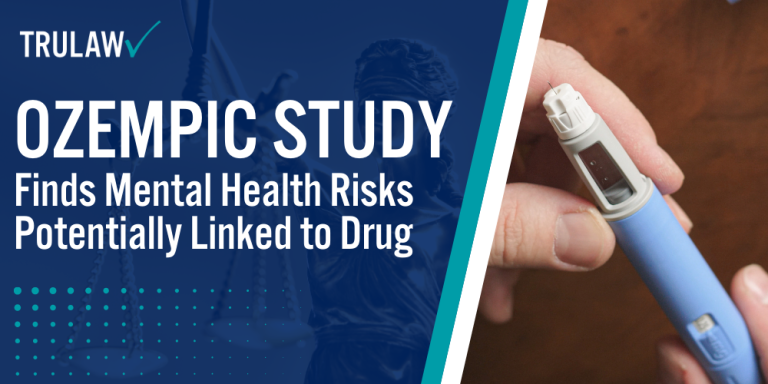
Potential Mental Health Risks Associated with Ozempic
A new Ozempic study published in the International Journal of Clinical Pharmacy has brought to light the association between semaglutide use and adverse psychiatric events, including depression, anxiety, and suicidal thoughts.
Despite Novo Nordisk’s (the pharmaceutical manufacturer) reassurance of Ozempic’s safety, the study urges healthcare providers to consider these potential risks seriously.
This investigation analyzed adverse event reports linked to semaglutide and related medications, uncovering a concerning number of psychiatric episodes.
The critical insights from this study include:
- The study identified 481 reports of adverse psychiatric episodes, emphasizing a notable prevalence among women and fatal outcomes predominantly among men.
- These findings serve as an important reminder for physicians to conduct thorough mental health assessments before prescribing semaglutide-based medications to their patients.
- There is a need for ongoing monitoring and support for patients prescribed liraglutide-based medications to identify and manage potential psychiatric side effects promptly.
Addressing the Challenges: A Call for Comprehensive Care
The recent findings demand a strategic approach to prescribing Ozempic and its counterparts, emphasizing the importance of mental health evaluations and patient-physician communication.
It is crucial for patients to report any mood changes or negative thoughts to their healthcare providers promptly, fostering an environment where the benefits of medication do not come at the cost of patient safety.
The following strategies may be used to address these challenges:
- Informing patients about the potential side effects of Ozempic, including risks to mental health, to ensure safe medication use.
- Encouraging dialogue between patients and doctors about possible medication alternatives and closely monitoring for any adverse effects to help mitigate risks.
- Implementing regular mental health check-ups for patients using Ozempic to identify and address any emerging psychiatric symptoms quickly.
- Developing a comprehensive support system for patients experiencing side effects, offering counseling and mental health resources.
- Enhancing training for healthcare providers on the psychiatric side effects of Ozempic to support their patients better.
- Promoting research into the long-term effects of Ozempic on mental health to guide future prescribing practices.
The focus on Ozempic’s mental health risks highlights the need for a balanced understanding of its benefits and potential drawbacks.
As discussions around this medication continue, prioritizing patient safety and informed decision-making will be essential.
Table of Contents
Semaglutide Regulations: Navigating the Ozempic Lawsuit Landscape
The landscape of semaglutide, the active ingredient in Ozempic, is under intense scrutiny due to several lawsuits alleging insufficient warning about potential severe side effects.
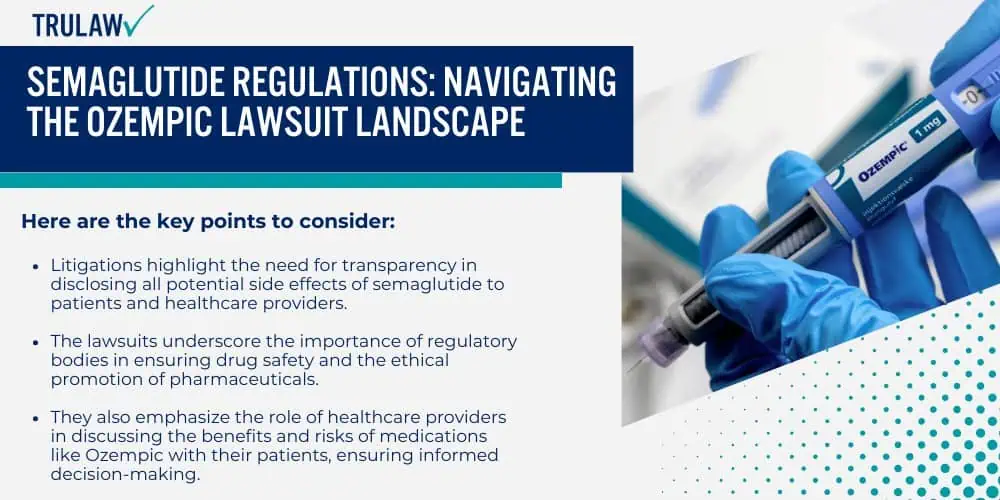
This legal scrutiny comes amid rising concerns over the drug’s widespread use, prompted by its popularity on social media platforms for off-label weight loss purposes beyond its primary indication for Type 2 diabetes management.
The Legal Battle: Unpacking the Ozempic Lawsuits
The heart of the legal battle against Ozempic revolves around allegations that the manufacturer, Novo Nordisk, failed to provide adequate warnings about the drug’s potential to cause serious side effects.
Lawsuits claim that patients were not fully informed about the risks associated with semaglutide, leading to calls for better regulation and accountability in pharmaceutical advertising and prescription practices.
Here are the key points to consider:
- Litigations highlight the need for transparency in disclosing all potential side effects of semaglutide to patients and healthcare providers.
- The lawsuits underscore the importance of regulatory bodies in ensuring drug safety and the ethical promotion of pharmaceuticals.
- They also emphasize the role of healthcare providers in discussing the benefits and risks of medications like Ozempic with their patients, ensuring informed decision-making.
Regulatory Responses and Recommendations
In response to these legal and health concerns, regulatory bodies are being urged to take stronger actions to ensure the safe use of semaglutide.
Recommendations for regulatory actions include stricter guidelines on pharmaceutical advertising, enhanced surveillance of drug side effects, and more rigorous requirements for patient education on medication risks and benefits.
The critical insights from this evolving situation include:
- A pressing need for updated regulatory guidelines that address the current landscape of drug promotion and prescription, especially in the digital age.
- Enhancing patient education and informed consent processes is crucial to safeguard patient health and autonomy.
- Ongoing research and post-marketing surveillance can be mandated to assess the safety profile of semaglutide continually.
Forward-Looking Strategies: Ensuring Patient Safety and Informed Use
As the legal proceedings unfold, it is imperative for all stakeholders, including pharmaceutical companies, healthcare providers, regulatory bodies, and patients, to collaborate in promoting the safe and informed use of semaglutide.
The following strategies can be used to address these challenges:
- Implementing stricter advertising regulations to prevent the promotion of off-label drug use may mislead patients about the safety and efficacy of medications like Ozempic.
- Enhancing the transparency and accessibility of information on medication risks and benefits, enabling patients to make informed healthcare decisions.
- Strengthening the role of healthcare providers in patient education, ensuring that discussions about drug choices include a comprehensive overview of potential side effects.
- Encouraging the development of more detailed patient information leaflets and consent forms that clearly communicate the risks associated with semaglutide.
- Advocating for ongoing post-marketing studies and surveillance to monitor the long-term effects of semaglutide on patient health.
- Promoting patient advocacy and support groups to provide resources and support for individuals experiencing side effects from semaglutide.
The Semaglutide Regulations and Ozempic Lawsuit narrative underscores the sophisticated relationship between pharmaceutical innovation, regulatory oversight, and the need for comprehensive patient education.
As the situation evolves, the focus remains on balancing the therapeutic benefits of semaglutide with the imperative to protect patient health through robust regulatory frameworks and informed healthcare practices.
Patient Perspectives on Ozempic's Legal Challenges
The legal and regulatory scrutiny surrounding Ozempic has far-reaching implications for manufacturers, regulators, and healthcare providers.
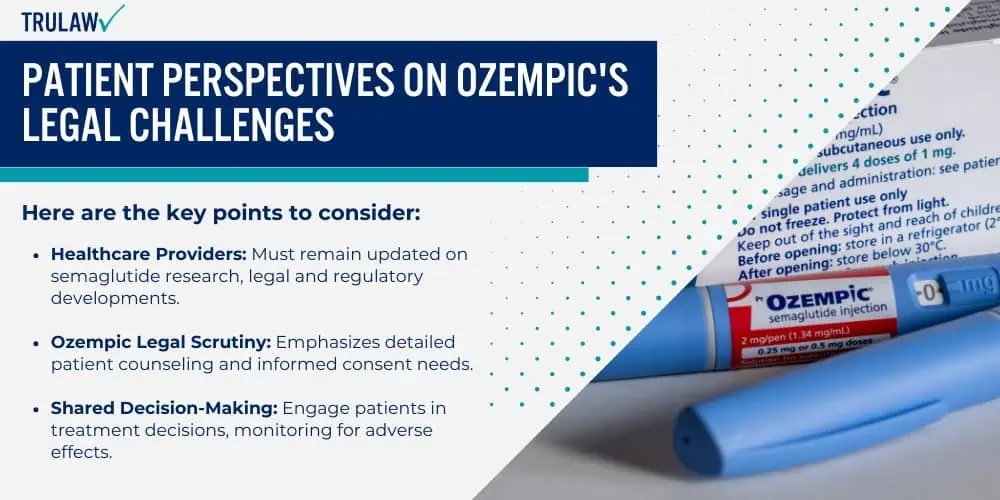
Ozempic’s Impact on Healthcare Providers
Healthcare providers are on the front lines, tasked with balancing the therapeutic benefits of Ozempic against the potential risks highlighted by recent Ozempic lawsuits and regulatory concerns.
This situation demands a reevaluation of prescribing practices and patient counseling processes to ensure that treatment decisions are made with a full understanding of the potential risks and benefits.
Here are the key points to consider:
- Healthcare Providers: Must remain updated on semaglutide research, legal and regulatory developments.
- Ozempic Legal Scrutiny: Emphasizes detailed patient counseling and informed consent needs.
- Shared Decision-Making: Engage patients in treatment decisions, monitoring for adverse effects.
Semaglutide Concerns: Informed Decision-Making
Patients prescribed Ozempic for diabetes management or considering its off-label use for weight loss are increasingly concerned about the medication’s safety profile.
The ongoing Ozempic lawsuits and media coverage have heightened awareness and apprehension, making it crucial for patients to have access to accurate and comprehensive information.
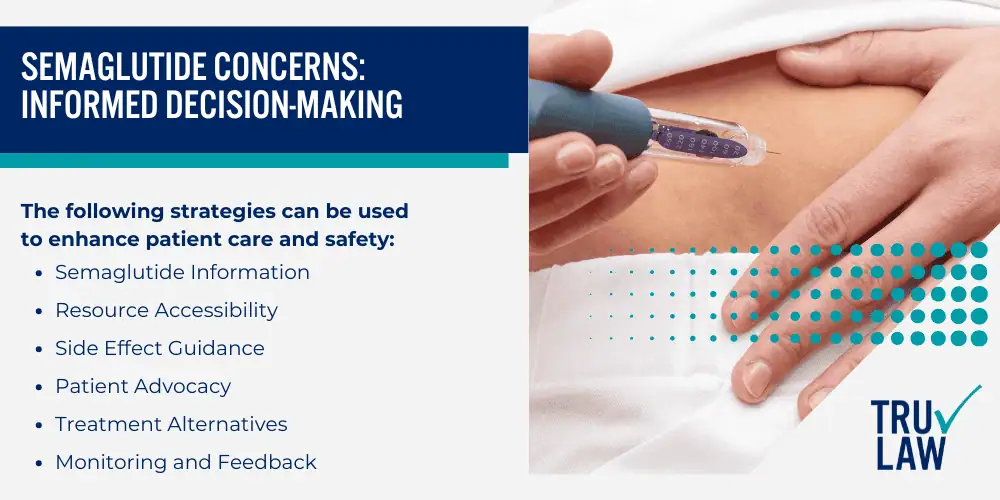
The following strategies can be used to enhance patient care and safety:
- Semaglutide Information: Ensure patients have access to clear and comprehensive risk information.
- Resource Accessibility: Provide easily accessible resources for informed decision-making.
- Side Effect Guidance: Offer guidance on managing and reporting side effects.
- Patient Advocacy: Support patient engagement in healthcare decisions.
- Treatment Alternatives: Discuss all available treatment options, including benefits and risks.
- Monitoring and Feedback: Implement systems for ongoing patient feedback and monitoring.
Looking Ahead: The Path to Patient-Centric Care and Safety
The legal challenges facing Ozempic serve as a catalyst for advancing patient-centric care models that prioritize safety, informed choice, and shared decision-making.
Ensuring that patients are fully informed about their treatment options, including the benefits and risks of medications like Ozempic, is essential for fostering trust and ensuring the efficacy of treatment plans.
The following strategies can be used to enhance patient care and safety:
- Developing comprehensive educational materials that detail the potential side effects and legal concerns associated with Ozempic, tailored to patient literacy levels.
- Establishing clear guidelines for healthcare providers to discuss off-label medication use ensures patients receive balanced information.
- Enhancing surveillance and reporting mechanisms for adverse effects to improve the post-marketing safety profile of Ozempic.
- Fostering collaboration between patients, healthcare providers, and patient advocacy groups to support informed decision-making and patient empowerment.
- Encouraging ongoing research into the benefits and risks of Ozempic to inform future clinical guidelines and patient care practices.
The dialogue surrounding Ozempic, encompassing legal challenges, regulatory responses, and the perspectives of healthcare providers and patients, highlights the dynamic nature of modern medicine.
As we move forward, the emphasis on patient safety, informed consent, and the therapeutic alliance will guide us through the benefits and risks of emerging treatments in an informed and ethical manner.
Psychiatric Health Implications of Semaglutide: A Comprehensive Review
Recent findings published in the International Journal of Clinical Pharmacy have highlighted the potential psychiatric side effects associated with the use of Semaglutide, a GLP-1 receptor agonist lauded for its efficacy in weight management.
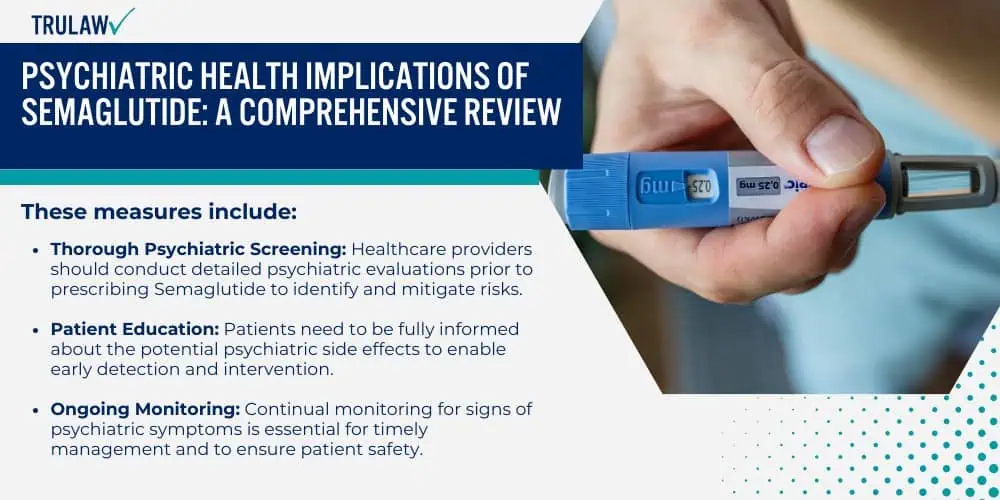
This revelation prompts a thorough examination and discussion regarding the psychiatric implications of Semaglutide therapy.
Recommendations for Semaglutide Users to Address Psychiatric Health Concerns
The study emphasizes the need for proactive measures to protect individuals on Semaglutide from potential psychiatric side effects.
These measures include:
- Thorough Psychiatric Screening: Healthcare providers should conduct detailed psychiatric evaluations prior to prescribing Semaglutide to identify and mitigate risks.
- Patient Education: Patients need to be fully informed about the potential psychiatric side effects to enable early detection and intervention.
- Ongoing Monitoring: Continual monitoring for signs of psychiatric symptoms is essential for timely management and to ensure patient safety.
- Personalized Treatment Plans: Consideration of individual patient history and risk factors is vital for tailoring treatment plans that minimize psychiatric side effects.
- Collaborative Care Approach: Integrating mental health professionals into the care team can provide specialized support and intervention strategies for those at risk.
- Ongoing Education: Keeping patients and healthcare providers updated on the latest research and strategies for managing psychiatric side effects is key to ensuring the safe use of Semaglutide.
- Safety Net Services: Establishing access to mental health crisis services for patients experiencing severe psychiatric reactions is an essential safety measure.
Legal and Healthcare Challenges Arising from Semaglutide’s Potential Psychiatric Impact
These findings play a crucial role in shaping regulatory policies and research conducted to investigate the potential adverse psychiatric effects of Semaglutide.
Future implications and considerations may involve:
- Enhanced Regulatory Scrutiny: The mental health safety profile of Semaglutide may lead to stricter regulatory reviews and guidelines.
- Legal Implications: The documentation of severe psychiatric adverse events could spark legal action, emphasizing the need for comprehensive consent processes and patient education.
- Commitment to Research: Persistent research efforts are crucial for developing strategies to minimize the psychiatric risks associated with Semaglutide, ensuring that patients can benefit from its therapeutic potential without compromising their mental health.
- Public Awareness Campaigns: Increasing public awareness about the potential psychiatric effects of Semaglutide and the importance of mental health monitoring can empower patients to seek help promptly.
This comprehensive analysis underscores the importance of balancing the therapeutic advantages of Semaglutide with the need to safeguard patient mental health, advocating for informed treatment decisions and robust support frameworks.
Efficacy of Semaglutide in Weight Management
Semaglutide, a GLP-1 receptor agonist, has gained widespread attention for its efficacy in weight management.
Clinical trials and real-world studies have consistently demonstrated its ability to significantly reduce body weight in individuals with obesity or overweight, marking it as a pivotal tool in the fight against obesity.
Key points pertaining to the efficacy of Semaglutide include, but are not limited to:
- Significant Weight Loss: Semaglutide has been shown to facilitate substantial weight loss, with participants losing up to 15% of their body weight over treatment periods.
- Long-term Management: Beyond acute weight loss, Semaglutide supports long-term weight management, helping individuals maintain their weight loss over extended periods.
- Mechanism of Action: It mimics the GLP-1 hormone, which regulates appetite and food intake, reducing hunger and calorie intake.
Clinical Implications
The implications of Semaglutide’s efficacy in weight management extend beyond mere weight loss.
Its use has been associated with improvements in various health markers, including reductions in waist circumference, blood pressure, and blood lipids and glucose levels.
While Semaglutide represents a promising option for weight management, healthcare providers must consider individual patient factors when prescribing this medication.
Comparative Analysis of Semaglutide with Other GLP-1 Receptor Agonists
In the landscape of GLP-1 receptor agonists, Semaglutide stands out for its efficacy, safety profile, and patient convenience, distinguishing itself from other agents in the class.
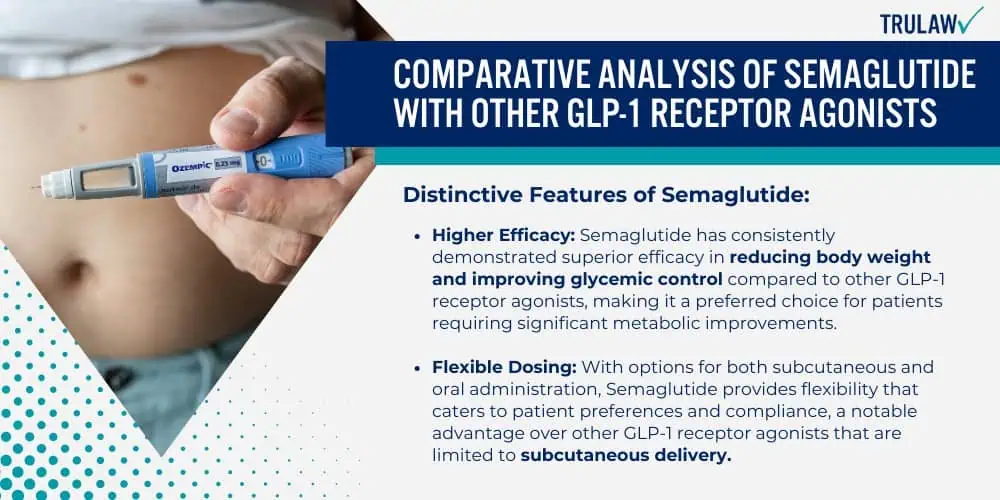
This comparative analysis highlights the unique aspects of Semaglutide relative to its counterparts, such as Liraglutide and Dulaglutide, offering insights into its preferred status for certain patient populations.
Distinctive Features of Semaglutide:
- Higher Efficacy: Semaglutide has consistently demonstrated superior efficacy in reducing body weight and improving glycemic control compared to other GLP-1 receptor agonists, making it a preferred choice for patients requiring significant metabolic improvements.
- Flexible Dosing: With options for both subcutaneous and oral administration, Semaglutide provides flexibility that caters to patient preferences and compliance, a notable advantage over other GLP-1 receptor agonists that are limited to subcutaneous delivery.
- Extended Half-Life: Semaglutide’s long half-life allows for weekly dosing, which is more convenient for patients and can lead to better adherence compared to the more frequent dosing requirements of other GLP-1 receptor agonists.
Comparative Clinical Outcomes:
Studies comparing Semaglutide with other GLP-1 receptor agonists have highlighted its superior performance in key clinical outcomes.
For instance, in head-to-head trials, Semaglutide has shown greater efficacy in lowering HbA1c levels and achieving weight loss goals, underscoring its potential for patients with type 2 diabetes and obesity.
Patient Selection and Considerations:
While Semaglutide offers distinct advantages, the selection of a GLP-1 receptor agonist should be personalized based on patient-specific factors, including medical history, treatment goals, and potential side effects.
Healthcare providers must weigh the benefits of Semaglutide against its cost and the patient’s preference for the administration route when making treatment decisions.
Its role in the management of type 2 diabetes and obesity is increasingly prominent, reflecting its importance in personalized medicine and patient-centered care.
Semaglutide and Cardiovascular Outcomes
Semaglutide’s impact on cardiovascular health represents a significant advancement in the treatment of type 2 diabetes and obesity.
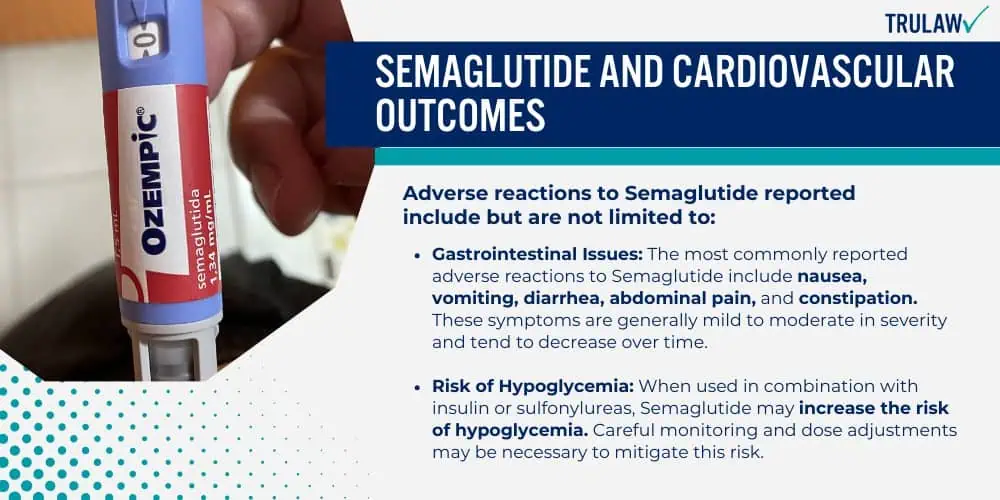
Adverse Reactions and Safety Profile of Semaglutide
The safety profile of Semaglutide is an essential consideration in its clinical use for the management of type 2 diabetes and obesity.
While Semaglutide has demonstrated significant efficacy in these areas, understanding its adverse reactions is crucial for optimizing patient outcomes and ensuring safe treatment protocols.
Adverse reactions to Semaglutide reported include but are not limited to:
- Gastrointestinal Issues: The most commonly reported adverse reactions to Semaglutide include nausea, vomiting, diarrhea, abdominal pain, and constipation. These symptoms are generally mild to moderate in severity and tend to decrease over time.
- Risk of Hypoglycemia: When used in combination with insulin or sulfonylureas, Semaglutide may increase the risk of hypoglycemia. Careful monitoring and dose adjustments may be necessary to mitigate this risk.
- Pancreatitis: Although rare, Semaglutide has been associated with an increased risk of pancreatitis. Patients should be informed of the symptoms of pancreatitis and advised to seek medical attention if they experience such symptoms.
Patient Education and Support
Educating patients about the potential adverse reactions of Semaglutide and providing support on how to manage them is vital.
This includes guidance on dietary modifications to mitigate gastrointestinal side effects and instructions on recognizing symptoms of serious adverse reactions.
The safety considerations must be exercised with Semaglutide:
- Cautions and Contraindications: Semaglutide is contraindicated in patients with a personal or family history of medullary thyroid carcinoma and those with multiple endocrine neoplasia syndrome type 2. It should be used with caution in patients with a history of pancreatitis.
- Monitoring and Management: Regular monitoring of patients for adverse reactions and appropriate dose adjustments can help manage the risk of side effects and improve tolerability.
By adopting a proactive approach to monitoring and patient education, healthcare providers can maximize the therapeutic benefits of Semaglutide while minimizing its risks.
Ozempic Lawsuit Frequently Asked Questions
-
Ozempic is a medication that mimics the GLP-1 hormone, which regulates appetite and food intake.
By reducing hunger and calorie intake, Ozempic has been shown to facilitate substantial weight loss in individuals with obesity or overweight.
-
A recent study published in the International Journal of Clinical Pharmacy has highlighted the potential link between Ozempic and rare but severe psychiatric episodes, including depression, anxiety, and suicidal thoughts.
Healthcare providers should conduct thorough psychiatric evaluations before prescribing Ozempic and closely monitor patients for any adverse mental health effects.
-
The influence of social media platforms like TikTok has significantly contributed to the widespread use of Ozempic for weight loss, with hashtags amassing over 1.4 billion views.
However, this rapid rise in popularity has overshadowed the importance of understanding the medication’s full range of effects, especially concerning mental health risks.
-
Ozempic is currently facing several lawsuits alleging that the manufacturer, Novo Nordisk, failed to provide adequate warnings about the drug’s potential to cause serious side effects.
These litigations highlight the need for transparency in disclosing all potential side effects to patients and healthcare providers.
-
Healthcare providers should develop comprehensive educational materials that detail the potential side effects and legal concerns associated with Ozempic, tailored to patient literacy levels.
Establishing clear guidelines for discussing off-label medication use and enhancing surveillance and reporting mechanisms for adverse effects can also improve patient safety.

Managing Attorney & Owner
With over 25 years of legal experience, Jessica Paluch-Hoerman is an Illinois lawyer, a CPA, and a mother of three. She spent the first decade of her career working as an international tax attorney at Deloitte.
In 2009, Jessie co-founded her own law firm with her husband – which has scaled to over 30 employees since its conception.
In 2016, Jessie founded TruLaw, which allows her to collaborate with attorneys and legal experts across the United States on a daily basis. This hypervaluable network of experts is what enables her to share the most reliable, accurate, and up-to-date legal information with our readers!
Additional Ozempic Lawsuit resources on our website:
Here, at TruLaw, we’re committed to helping victims get the justice they deserve.
Alongside our partner law firms, we have successfully collected over $3 Billion in verdicts and settlements on behalf of injured individuals.
Would you like our help?
At TruLaw, we fiercely combat corporations that endanger individuals’ well-being. If you’ve suffered injuries and believe these well-funded entities should be held accountable, we’re here for you.
With TruLaw, you gain access to successful and seasoned lawyers who maximize your chances of success. Our lawyers invest in you—they do not receive a dime until your lawsuit reaches a successful resolution!
AFFF Lawsuit claims are being filed against manufacturers of aqueous film-forming foam (AFFF), commonly used in firefighting.
Claims allege that companies such as 3M, DuPont, and Tyco Fire Products failed to adequately warn users about the potential dangers of AFFF exposure — including increased risks of various cancers and diseases.
Depo Provera Lawsuit claims are being filed by individuals who allege they developed meningioma (a type of brain tumor) after receiving Depo-Provera birth control injections.
A 2024 study found that women using Depo-Provera for at least 1 year are five times more likely to develop meningioma brain tumors compared to those not using the drug.
Suboxone Tooth Decay Lawsuit claims are being filed against Indivior, the manufacturer of Suboxone, a medication used to treat opioid addiction.
Claims allege that Indivior failed to adequately warn users about the potential dangers of severe tooth decay and dental injuries associated with Suboxone’s sublingual film version.
Social Media Harm Lawsuits are being filed against social media companies for allegedly causing mental health issues in children and teens.
Claims allege that companies like Meta, Google, ByteDance, and Snap designed addictive platforms that led to anxiety, depression, and other mental health issues without adequately warning users or parents.
Transvaginal Mesh Lawsuits are being filed against manufacturers of transvaginal mesh products used to treat pelvic organ prolapse (POP) and stress urinary incontinence (SUI).
Claims allege that companies like Ethicon, C.R. Bard, and Boston Scientific failed to adequately warn about potential dangers — including erosion, pain, and infection.
Bair Hugger Warming Blanket Lawsuits involve claims against 3M — alleging their surgical warming blankets caused severe infections and complications (particularly in hip and knee replacement surgeries).
Plaintiffs claim 3M failed to warn about potential risks — despite knowing about increased risk of deep joint infections since 2011.
Baby Formula NEC Lawsuit claims are being filed against manufacturers of cow’s milk-based baby formula products.
Claims allege that companies like Abbott Laboratories (Similac) and Mead Johnson & Company (Enfamil) failed to warn about the increased risk of necrotizing enterocolitis (NEC) in premature infants.
Here, at TruLaw, we’re committed to helping victims get the justice they deserve.
Alongside our partner law firms, we have successfully collected over $3 Billion in verdicts and settlements on behalf of injured individuals.
Would you like our help?
